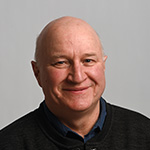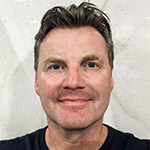Carl Wagner Memorial Award
Tuesday, 1700h / Room F6 (Level 2)
Free Electrons to Molecular Bonds and Back – The Dark Side of Solar Fuels and Chemicals
by Peter Strasser
Peter Strasser is Chaired Professor of Electrochemistry in the Department of Chemistry at the Technische Universität Berlin. Electrocatalysis is a central theme of his career, with interests ranging from electrocatalytic oscillations to high throughput catalyst discovery and the fundamental understanding of electrified catalytic interfaces for clean energy technologies.
Prof. Strasser studied chemistry at Universität Tübingen, Stanford University, and Università degli Studi di Padova. He received his PhD in Physical Electrochemistry under Gerhard Ertl at the Fritz-Haber-Institut of the Max-Planck-Gesellschaft. He worked at Symyx Technologies from 2000-2004 as a postdoctoral associate and Senior Staff Scientist, then as an Assistant Professor in the Department of Chemical and Biomolecular Engineering at the University of Houston from 2004-2007. He joined the faculty of the Technische Universität Berlin in 2007.
Recognition of his work includes the F-cell award, European Fuel Cell Forum Christian Schönbein Gold Medal, Faraday Medal, International Society of Electrochemistry (ISE) Brian Conway Prize, Sir William Grove Award, German Catalysis Society Otto-Roelen Medal in Catalysis, and Max-Planck-Gesellschaft Otto-Hahn Medal. He is an ISE Fellow. With his team, Prof. Strasser has authored more than 350 journal publications and edited the book, High-Throughput Screening in Chemical Catalysis. He is a named inventor on 19 issued U.S. and European patents. Spin-off companies commercializing technology from his lab include DexLeChem and Liquid Loop. For more than 10 years, Prof. Strasser has co-organized the ECS fall meeting PEFC&E fuel cell and electrolyzer symposia. He happily drives a hydrogen fuel cell vehicle which he wouldn’t trade for a battery vehicle!
Olin Palladium Award
 Tuesday 1100h / Room A4 (Level 1)
Tuesday 1100h / Room A4 (Level 1)
Our Path to Long Lifetime Li-ion and Na-ion Cells
by Jeff R. Dahn
Jeff Dahn is Canada Research Chair in Materials for Advanced Batteries and Professor of Physics and Professor of Chemistry at Dalhousie University. He was born in Bridgeport, CT, in 1957, and emigrated with his family to Nova Scotia, Canada, in 1970. He obtained his BS in Physics from Dalhousie University (1978) and his PhD from the University of British Columbia in 1982. Prof. Dahn then worked at the National Research Council of Canada (1982-1985) and at Moli Energy Limited (1985-1990), where he did pioneering work on lithium ion batteries before taking up a faculty position in the Physics Department at Simon Fraser University in 1990. He returned to Dalhousie University in 1996. His wife, Kathy, his children, Hannah, Tara, and Jackson, and their spouses, are all Dalhousie graduates.
Prof. Dahn has always had strong interactions with industry. He was the NSERC/3M Canada Industrial Research Chair in Materials for Advanced Batteries at Dalhousie University from 1996 to 2016. In 2016, he became the NSERC/Tesla Canada Industrial Research Chair. His group’s efforts focus on helping to improve the Li-ion cells used in Tesla’s vehicles and energy storage products. Prof. Dahn is the author or co-author of over 770 refereed journal papers and 78 inventions with patents issued or filed. Jeff has trained over 60 PhD students and more than 25 postdoctoral fellows in his career. Many of these hold senior positions in battery and battery materials companies around the world; six are CEOs of their own companies.
Prof. Dahn’s research has been recognized with national and international awards including the 2022 Killam Prize, 2017 Gerhard Herzberg Gold Medal in Science and Engineering, 2016 Governor General’s Innovation Award, 2011 ECS Battery Division Technology Award, 2009 Canadian Association of Physicists (CAP) Medal for Excellence in Teaching, 1996 ECS Battery Division Research Award, 1996 CAP Herzberg Medal, and 1987 CAP Medal for Innovation in Physics. He is a Fellow of The Electrochemical Society and Royal Society of Canada, and Officer of the Order of Canada.






